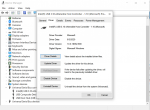I have ran rtl_test to find the issue with failed CRC's in DSD+FL. I don't know if it's the bottleneck of the RTL-SDR being a USB 2.0 device on a USB3.1 integrated circuit. There is no USB 2.0 connections. I know USB3.1 is backwards compatible. This much loss in bytes is concerning.
wmic returns:
Same results testing my other dongle. I suggest that on some USB3.1 hardware backwards compatibility to USB2.0 is limited or maybe restricted when using RTL-SDR's on USB3.1. It does work. I can run SDR#, SDRTrunk, RTL1090. I am also not even sure if rtl_test is able to read correctly from a USB3.1 controller very well.
Any thoughts?
Found 1 device(s):
0: NooElec, NESDR Nano 3, SN: 7197503488
Using device 0: Generic RTL2832U OEM
Found Rafael Micro R820T/2 tuner
Supported gain values (29): 0.0 0.9 1.4 2.7 3.7 7.7 8.7 12.5 14.4 15.7 16.6 19.7 20.7 22.9 25.4 28.0 29.7 32.8 33.8 36.4 37.2 38.6 40.2 42.1 43.4 43.9 44.5 48.0 49.6
Sampling at 2048000 S/s.
Info: This tool will continuously read from the device, and report if
samples get lost. If you observe no further output, everything is fine.
Reading samples in async mode...
Allocating 15 (non-zero-copy) user-space buffers
lost at least 3220 bytes in buffer 0
lost at least 2888 bytes in buffer 2
lost at least 3688 bytes in buffer 3
lost at least 3480 bytes in buffer 4
lost at least 3400 bytes in buffer 5
lost at least 3584 bytes in buffer 6
lost at least 3500 bytes in buffer 7
lost at least 3648 bytes in buffer 8
lost at least 3296 bytes in buffer 9
...
.........
Signal caught, exiting!
lost at least 4396 bytes in buffer 339
User cancel after 340 buffers, exiting...
Samples per million lost (minimum): 24
C:\Users\ddejr\Downloads\librtlsdr-win32_2020-08-26>cd\
C:\>cd C:\Users\ddejr\Downloads\RelWithDebInfo\rtl-sdr-release\x64
C:\Users\ddejr\Downloads\RelWithDebInfo\rtl-sdr-release\x64>rtl_test
Found 1 device(s):
0: NooElec, NESDR Nano 3, SN: 7197503488
Using device 0: Generic RTL2832U OEM
Found Rafael Micro R820T tuner
Supported gain values (29): 0.0 0.9 1.4 2.7 3.7 7.7 8.7 12.5 14.4 15.7 16.6 19.7 20.7 22.9 25.4 28.0 29.7 32.8 33.8 36.4 37.2 38.6 40.2 42.1 43.4 43.9 44.5 48.0 49.6
Sampling at 2048000 S/s.
Info: This tool will continuously read from the device, and report if
samples get lost. If you observe no further output, everything is fine.
Reading samples in async mode...
lost at least 44 bytes
lost at least 5440 bytes
lost at least 3744 bytes
lost at least 3396 bytes
lost at least 3552 bytes
lost at least 3292 bytes
lost at least 5016 bytes
lost at least 2440 bytes
lost at least 3212 bytes
lost at least 3432 bytes
lost at least 3348 bytes
lost at least 3624 bytes
lost at least 2848 bytes
lost at least 1656 bytes
Signal caught, exiting!
lost at least 1672 bytes
wmic returns:
C:\windows\system32>wmic path CIM_LogicalDevice where "Description like 'USB%'" get /value
Availability=
Caption=Intel(R) USB 3.10 eXtensible Host Controller - 1.10 (Microsoft)
ConfigManagerErrorCode=0
ConfigManagerUserConfig=FALSE
CreationClassName=Win32_USBController
Description=USB xHCI Compliant Host Controller
DeviceID=PCI\VEN_8086&DEV_34ED&SUBSYS_86AB103C&REV_30\3&11583659&2&A0
ErrorCleared=
ErrorDescription=
InstallDate=
LastErrorCode=
Manufacturer=Generic USB xHCI Host Controller
MaxNumberControlled=
Name=Intel(R) USB 3.10 eXtensible Host Controller - 1.10 (Microsoft)
PNPDeviceID=PCI\VEN_8086&DEV_34ED&SUBSYS_86AB103C&REV_30\3&11583659&2&A0
PowerManagementCapabilities=
PowerManagementSupported=
ProtocolSupported=16
Status=OK
StatusInfo=
SystemCreationClassName=Win32_ComputerSystem
SystemName=LAPTOP-M9R2RSHR
TimeOfLastReset=
Availability=
Caption=USB Composite Device
ClassCode=
ConfigManagerErrorCode=0
ConfigManagerUserConfig=FALSE
CreationClassName=Win32_USBHub
CurrentAlternateSettings=
CurrentConfigValue=
Description=USB Composite Device
DeviceID=USB\VID_05C8&PID_03BC\5&2A3BC1ED&0&3
ErrorCleared=
ErrorDescription=
GangSwitched=
InstallDate=
LastErrorCode=
Name=USB Composite Device
NumberOfConfigs=
NumberOfPorts=
PNPDeviceID=USB\VID_05C8&PID_03BC\5&2A3BC1ED&0&3
PowerManagementCapabilities=
PowerManagementSupported=
ProtocolCode=
Status=OK
StatusInfo=
SubclassCode=
SystemCreationClassName=Win32_ComputerSystem
SystemName=LAPTOP-M9R2RSHR
USBVersion=
Availability=
Caption=USB Root Hub (USB 3.0)
ClassCode=
ConfigManagerErrorCode=0
ConfigManagerUserConfig=FALSE
CreationClassName=Win32_USBHub
CurrentAlternateSettings=
CurrentConfigValue=
Description=USB Root Hub (USB 3.0)
DeviceID=USB\ROOT_HUB30\4&2217AD68&0&0
ErrorCleared=
ErrorDescription=
GangSwitched=
InstallDate=
LastErrorCode=
Name=USB Root Hub (USB 3.0)
NumberOfConfigs=
NumberOfPorts=
PNPDeviceID=USB\ROOT_HUB30\4&2217AD68&0&0
PowerManagementCapabilities=
PowerManagementSupported=
ProtocolCode=
Status=OK
StatusInfo=
SubclassCode=
SystemCreationClassName=Win32_ComputerSystem
SystemName=LAPTOP-M9R2RSHR
USBVersion=
Availability=
Caption=USB Composite Device
ClassGuid={36fc9e60-c465-11cf-8056-444553540000}
CompatibleID={"USB\DevClass_00&SubClass_00&Prot_00","USB\DevClass_00&SubClass_00","USB\DevClass_00","USB\COMPOSITE"}
ConfigManagerErrorCode=0
ConfigManagerUserConfig=FALSE
CreationClassName=Win32_PnPEntity
Description=USB Composite Device
DeviceID=USB\VID_05C8&PID_03BC\5&2A3BC1ED&0&3
ErrorCleared=
ErrorDescription=
HardwareID={"USB\VID_05C8&PID_03BC&REV_0003","USB\VID_05C8&PID_03BC"}
InstallDate=
LastErrorCode=
Manufacturer=(Standard USB Host Controller)
Name=USB Composite Device
PNPClass=USB
PNPDeviceID=USB\VID_05C8&PID_03BC\5&2A3BC1ED&0&3
PowerManagementCapabilities=
PowerManagementSupported=
Present=TRUE
Service=usbccgp
Status=OK
StatusInfo=
SystemCreationClassName=Win32_ComputerSystem
SystemName=LAPTOP-M9R2RSHR
Availability=
Caption=Intel(R) USB 3.10 eXtensible Host Controller - 1.10 (Microsoft)
ClassGuid={36fc9e60-c465-11cf-8056-444553540000}
CompatibleID={"PCI\VEN_8086&DEV_34ED&REV_30","PCI\VEN_8086&DEV_34ED","PCI\VEN_8086&CC_0C0330","PCI\VEN_8086&CC_0C03","PCI\VEN_8086","PCI\CC_0C0330","PCI\CC_0C03"}
ConfigManagerErrorCode=0
ConfigManagerUserConfig=FALSE
CreationClassName=Win32_PnPEntity
Description=USB xHCI Compliant Host Controller
DeviceID=PCI\VEN_8086&DEV_34ED&SUBSYS_86AB103C&REV_30\3&11583659&2&A0
ErrorCleared=
ErrorDescription=
HardwareID={"PCI\VEN_8086&DEV_34ED&SUBSYS_86AB103C&REV_30","PCI\VEN_8086&DEV_34ED&SUBSYS_86AB103C","PCI\VEN_8086&DEV_34ED&CC_0C0330","PCI\VEN_8086&DEV_34ED&CC_0C03"}
InstallDate=
LastErrorCode=
Manufacturer=Generic USB xHCI Host Controller
Name=Intel(R) USB 3.10 eXtensible Host Controller - 1.10 (Microsoft)
PNPClass=USB
PNPDeviceID=PCI\VEN_8086&DEV_34ED&SUBSYS_86AB103C&REV_30\3&11583659&2&A0
PowerManagementCapabilities=
PowerManagementSupported=
Present=TRUE
Service=USBXHCI
Status=OK
StatusInfo=
SystemCreationClassName=Win32_ComputerSystem
SystemName=LAPTOP-M9R2RSHR
Availability=
Caption=USB Root Hub (USB 3.0)
ClassGuid={36fc9e60-c465-11cf-8056-444553540000}
CompatibleID=
ConfigManagerErrorCode=0
ConfigManagerUserConfig=FALSE
CreationClassName=Win32_PnPEntity
Description=USB Root Hub (USB 3.0)
DeviceID=USB\ROOT_HUB30\4&2217AD68&0&0
ErrorCleared=
ErrorDescription=
HardwareID={"USB\ROOT_HUB30&VID8086&PID34ED&REV0030","USB\ROOT_HUB30&VID8086&PID34ED","USB\ROOT_HUB30"}
InstallDate=
LastErrorCode=
Manufacturer=(Standard USB HUBs)
Name=USB Root Hub (USB 3.0)
PNPClass=USB
PNPDeviceID=USB\ROOT_HUB30\4&2217AD68&0&0
PowerManagementCapabilities=
PowerManagementSupported=
Present=TRUE
Service=USBHUB3
Status=OK
StatusInfo=
SystemCreationClassName=Win32_ComputerSystem
SystemName=LAPTOP-M9R2RSHR
Same results testing my other dongle. I suggest that on some USB3.1 hardware backwards compatibility to USB2.0 is limited or maybe restricted when using RTL-SDR's on USB3.1. It does work. I can run SDR#, SDRTrunk, RTL1090. I am also not even sure if rtl_test is able to read correctly from a USB3.1 controller very well.
Any thoughts?
Last edited:




